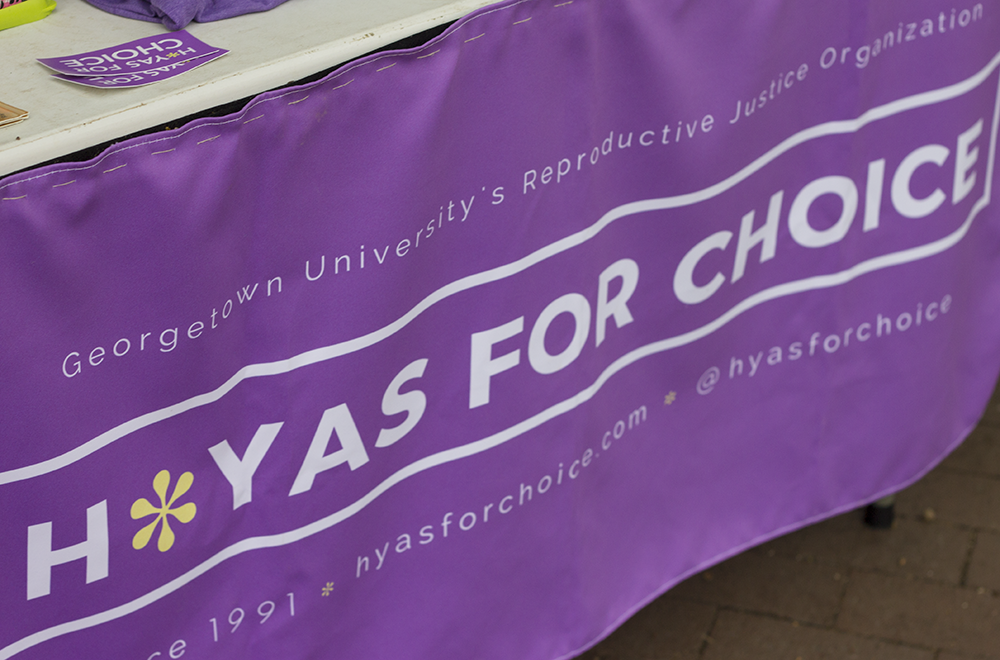H*yas for Choice, the unrecognized, pro-reproductive rights student group, held its annual Choice Week from Monday, March 19 to Friday, March 23 to encourage discussions on issues of reproductive health.
This year’s Choice Week consisted of five events focused on reproductive justice. The events included discussions on what it means to be both pro-abortion rights and Catholic on Monday, the racialization of maternal care in the United States Tuesday and the intersections between pro-abortion rights activism and transgender rights activism Wednesday.
The keynote event, which took place Thursday, featured a speech by Sarah Pappalardo, co-founder and editor of Reductress, a feminist satirical news website. Pappalardo spoke on the use of satire and media as tools for social justice.
The week culminated with an abortion “story share” Friday, when members of the Georgetown community who have had abortions had the opportunity to share their experiences. Over 120 people participated in the week, according to a statement from H*yas For Choice.

H*yas for Choice believes that Choice Week is crucial for the Georgetown community, especially given Georgetown’s identity as a Jesuit university, according to Lane Easterling (SFS ’19), director of media for H*yas for Choice.
“This week is especially important at a Catholic and Jesuit university where only a narrow concept of reproductive rights is provided time, space, and resources by the administration to advocate for anti-choice policies and beliefs,” Easterling wrote in an email to The Hoya. “We want to provide the Georgetown community with a platform for speakers, dialogue, and spaces to discuss reproductive issues that are not brought up, or are even barred from being mentioned, on campus and yet are important to all of us.”
Each event touched on the week’s reproductive justice theme, which emphasized pro-abortion rights advocacy through an intersectional lens, according to a H*yas for Choice press release.
Easterling said that the week’s theme “means destigmatizing all issues surrounding repro justice, including abortions, contraception, sex, pleasure, and health. It means highlighting the systemic reproductive injustices facing many oppressed groups. It means being proud of being pro-choice.”
Easterling added that this year’s Choice Week carries extra significance because of an increase in rhetorical attacks and legal limitations on reproductive rights since the election of President Donald Trump.
“Across the country, we have seen wholesale attacks on people’s health care, reproductive options, and bodily autonomy. Trans* folks and communities of color have borne the brunt of these attacks, which is why we have chosen to center these communities when creating our events and discussions,” Sterling wrote.
H*yas for Choice Co-President Annie Mason (COL ’18) said that she was pleased with the way Choice Week unfolded this year, pointing to broad demographics in attendance as a sign of success.
“Beyond our content with high turnout, students from many different communities on campus joined us and engaged with our speakers in meaningful and productive ways,” Mason said.
Mason also noted, however, the obstacles involved in planning an event like Choice Week as a student group that remains unrecognized by the university.
“As an unrecognized and unfunded group, planning Choice Week can be an extremely stressful experience because we never know if we’ll be able to reserve rooms — and often receive space confirmation last minute — and the process of obtaining funds to compensate speakers and get supplies for events ought to be a full-time job,” Mason wrote in an email to The Hoya.
Mason pointed to the group’s inability to guarantee the safety of staff members of partnered organizations without explicit support from the university.
“A community organization we wanted to partner with to host an event to destigmatize abortion could not come to campus because we were unrecognized and they feared the backlash and threat to safety their staff might experience if our organization did not have institutional support for the event,” Mason wrote.
However, H*yas for Choice is not discouraged by the difficulties presented by its status as an unrecognized student group, according to Mason.
“Ultimately, we’re used to having to overcome extra barriers to operate on Georgetown’s campus, “Mason wrote. “Our board and advocacy team worked hard to ensure Choice Week 2018 was still a success and we’re as excited as ever to continue offering inclusive, dynamic programming for our community in addition to our daily sexual health and contraception resource allocation.”
H*yas for Choice says that it hopes the end of Choice Week does not mean the end of the discussions that it promoted.
“It is our hope that those who attended these events continue these discussions with the broader Georgetown community and engage meaningfully with what it means to be pro-repro justice,” a H*yas for Choice statement read.




















